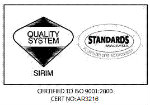Ethics Bridges The Generation Gap
It goes without saying that a strong civilization depends on the unity and solidarity existing within the nations under it. According to Ibn Khaldun, the great Arab philosopher of history and also famous as the Father of Modern Sociology, no society can achieve anything unless there is a strong consensus about its aims and vision of the nation.
To Ibn Khaldun, this consensus which is manifested through solidarity among the members of the nation(‘asabiyyah) will become stronger if it is joined by another most powerful social bonding factor, which is religion and ethics.
This is very much relevant in the case of Malaysia where the country is now in the course of planning for its future development involving younger generation through an initiative known as National Transformation 2050 (TN50).
In one of his speeches, the Minister of Youth and Sports has made it quite clear that one of the challenges of TN50 is to forge greater unity among Malaysians. The issue of solidarity again takes centre stage.
While the emphasis so far is placed more on the solidarity between different races in the country, another aspect of solidarity that must not be put aside is the solidarity among generations; the old and the young.
The problem of the generation gap, if looked closely, is indeed as divisive as the racial gap since it occurs right within the family which is the smallest, yet the instrumental institution within the fabric of a nation. Besides, it is also an issue that cuts across the different races and ethnicity.
It is always being pointed out that the wide gap between the old and the young is due to the different value systems both groups hold. The youths are characterized as being more open, free, plural, sceptical to authority while the old are seen to have a closed worldview, more principle-centred and loyal to authority.
Looking at the fast evolving world we are facing now and the openness of the younger generation in embracing new things that are emerging, the likelihood of generation gap to persist is bigger and becoming more difficult to mend.
While some may take the issue as not being so crucial, the social problems that arise from the issue, nevertheless, prove otherwise. For example, there is a growing number of cases where there are clashes between parents and children, children running from home, children leaving and abandoning their parents in old-folks home, parents suing their children due to inability to take care of them, and many others.
One pertinent question that should be put forward in the context of this generational gap is what is the fundamental difference between the two? Is it an essential difference which cannot be reconciled or is it a subjective difference which needs room for toleration.
While we are not concerned much with the difference pertaining subjective matters such as in terms of food preference, clothing, ways of social communication and choices of favourite songs, it is somehow worrying if the difference deals with fundamental principles in life such as ethics and religion. And to recall what is being said by Ibn Khaldun, religion and ethics are fundamental elements that can further strengthen the bond of a nation. If the difference of ethics and religion persists between the two generations, there is a strong possibility that the gap between them become wider and the aim of strengthening solidarity of the nation will be hampered.
It is therefore pertinent that religious and ethical elements such as mutual respect, ensuring justice and moderation have to be brought back as the key factor in strengthening the solidarity among the members of the nation. In the case of TN50, ethics and religious values must be set as among important principles in uniting the future generation of this country.
Some may argue that religion and ethics are the source of division rather than unity. The statement is right only when it refers to the radical approaches in interpreting religion and ethics by some extreme groups in certain religions. On the other hand, the role of religion as a whole, as history has recorded, is still instrumental especially in refining good characters of mankind, inculcating good virtues which lead to the building of great civilizations. Therefore, the focus of discussing religious and ethical principles should always be anchored on moderate understanding which is better left to the wise scholars among the religious adherents.
Further analysis on the role of religion and ethics will show that they are more conducive towards inculcating unity. They will unite the whole nation in terms of fundamental and permanent principles and values in life. The fundamental ethical principles, irrespective of religion, are mainly universal and could serve as uniting factor in guiding the nation in terms of their philosophy, vision and mission.
To the younger generation in particular, who are very vulnerable to radical changes and inconsistencies in life, these permanent ethical values would help them in facing future challenges in life. In addition, these principles will contribute to a large extent towards the proper refinement of human character which in turn can contribute towards lessening the ethical-moral problems faced by the society at all levels.
In sum, stronger ethical principles held by the people can gradually reduce the problem of generation gap. While the two generations can still differ and debate in what to eat for dinner and what to wear while attending wedding ceremonies, they should agree and be united in upholding fundamental ethical ideals in order for them to rise as a great and refined nation.




